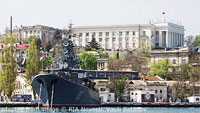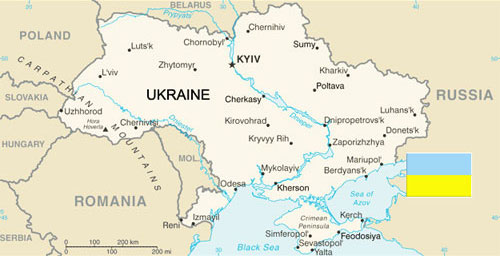Ukraine Awaits Economic Impact of New Government’s Tension With Russia

(Moscow Times – themoscowtimes.com – Delphine d’Amora – February 26, 2014) As Russia ally and former Ukrainian president Viktor Yanukovych fled and a new government took over in Kiev this weekend, Russia awoke to unpaid debts and a question: how to deal with its neighbor’s government not only politically, but economically.
“The main channel of influence on the Russian economy will be the price at which Russia delivers gas to Ukraine,” said Yulia Tseplyayeva, chief economist for Russia and the CIS at BNP Paribas.
The Russian government had previously lowered gas prices for Ukraine from $400 to $268.50 per thousand cubic meters in a deal brokered in the aftermath of Yanukovych’s decision to abandon a planned association agreement with the European Union, which led to months of anti-government protests throughout Ukraine.
The deal, along with plans for $15 billion in aid that accompanied it, will be honored, Prime Minister Dmitry Medvedev said Monday, adding that gas terms will be renegotiated.
The agreement “has concrete time periods for implementation. What will happen after these expire is a question for discussion with the leadership of Ukrainian companies and the Ukrainian government, if one emerges there,” Medvedev said, Reuters reported.
“We hope that the price will be stable,” Ukraine’s acting Energy Minister Eduard Stavytsky said Monday.
It would not make sense for the Russian government to change the price of gas for Ukraine now, said Mikhail Korchemkin from consulting company East European Gas Analysis.
Naftogaz, the Ukrainian state oil and gas monopoly, “is not paying its gas bills anyways. So if you raise the price, that would worsen the situation,” Korchemkin said.
The company threatened 11 regions with gas supply cuts late last week after they failed to pay off debts totaling $3 billion, Kyiv Post reported.
Naftogaz itself owed Russian energy giant Gazprom about $3 billion in 2013, although a Ukrainian official said last week that the company has paid $1.28 billion of the funds owed.
Combined with two large bonds that will mature this year – one from Naftogaz – Ukraine’s outstanding debt renders a default almost inevitable unless it receives external aid
Almost half of all Russian gas deliveries to Europe pass through Ukraine, eliciting concerns that continental Europe, which received 30 percent of its gas from Gazprom last year, could see shortages if Russia cuts supplies as it has during previous political spats with its western neighbor.
Gas reserves in Europe are fuller than normal thanks to a temperate winter, however, so Europe should stay warm even if Russia does cut gas to Ukraine, Reuters reported.
Russia has previously obstructed trade with Ukraine to make a political point and appears now to be continuing the practice.
In late January, as protests raged in the capital, Ukraine’s international trucking association said that Russia had tightened customs control and was holding shipments by up to 15 days while their paperwork was processed.
Similar tactics were seen last August, in what has widely been viewed as Russia’s attempt to demonstrate the penalties Ukraine would face with its looming European integration.
If Russia persists in this policy, the handicapping of Ukrainian competitors could even have a positive effect domestically, opening up the market to Russian metal producers, food producers and mechanical engineering companies, UralSib Capital chief economist Alexei Devyatov said.
The ultimate impact on Russia would still be “relatively small,” he added.
But for the teetering Ukrainian economy, obstacles to Russia-bound exports could be disastrous. The country is Ukraine’s second-largest export market, buying up $17.6 billion in goods, or a quarter of Ukraine’s total exports, each year.
While it remains to be seen how the Russia will deal with the new government, preliminary signs are not encouraging.
Prime Minister Medvedev on Monday said: “if you consider a government to be people who stroll through Kiev in black masks carrying Kalashnikov rifles, then it will be difficult to work with such a government,” PRIME news agency reported.

